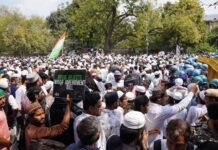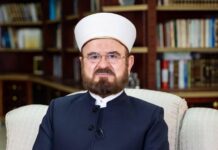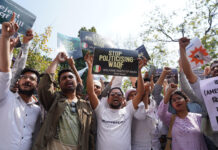Nearly 100 imams, academics and journalists have written an open letter expressing outrage at Professor Tariq Ramadan’s treatment by the French judiciary.
Ramadan has been held in preventative detention in a French prison and denied bail following allegations of rape to which he vehemently denies.
Incarcerated for over four months, Ramadan’s supporters say he has been denied appropriate treatment for a serious pre-existing medical condition and denied access to his full legal file.
They say French magistrates appeared to ignore the diagnoses of nine physicians that Professor Ramadan suffers from Multiple Sclerosis.
Signatories to the letter include Sheikh Yasir Qadhi, Sheikh Hamza Yusuf, author Karen Armstrong, filmmaker Ken Loach, journalist Peter Oborne, among many others.
Here is the letter in full:
OPEN LETTER: A WORLDWIDE APPEAL FOR DUE PROCESS FOR TARIQ RAMADAN
Subscribe to our newsletter and stay updated on the latest news and updates from around the Muslim world!
A Worldwide Appeal for Due Process for Tariq Ramadan. After four months of pre-trial detention, Tariq Ramadan’s last appeal for bail has again been denied.
As scholars and politicians from around the world, we write to demand due process for Professor Tariq Ramadan, incarcerated since February 2nd in a French prison.
It is not for us to judge Tariq Ramadan’s guilt or innocence. We fully recognize the rights of the plaintiffs to have their case heard without prejudice and without injury to their honour. But we wish to remind the country that has affirmed the inalienability of human rights and equality of the importance of respect for the principles that ensure the integrity of French justice.
We ask: Why has Mr. Ramadan been denied bail at the preliminary investigative stage although he willingly came for questioning and has given all required guarantees?
Has Mr. Ramadan been granted the equal treatment so prized by France when high-ranking political figures accused of similar offenses continue to enjoy full freedom of movement?
Is there one form of justice for Muslims in France and another for everyone else?
What justifies solitary confinement, limited family visitation rights, the denial of access to his case file and thus to the necessary means of preparing his defense?
Can prosecutors selectively leak information with impunity? Is it standard procedure in France for high-ranking political figures to publicly denigrate someone awaiting a trial?
In short, we respectfully ask, has Mr. Ramadan benefitted from a fair and equitable legal process, one in which he is presumed innocent until proven guilty?

These are straightforward questions of equal justice. To them we add deep concern for the dignity and humane treatment of all prisoners.
French magistrates have appeared to ignore the diagnoses of nine physicians that Mr. Ramadan suffers from multiple sclerosis, including the chief prison medical authority, who confirmed that his state of health is not compatible with continued incarceration.
Even though Mr. Ramadan suffers from multiple sclerosis and further neurological complications, proper medical treatment has not been provided.
We understand that the defense has appealed to the European Court of Human Rights against undue suffering he has undergone at the hands of the French justice.
We ask our French friends: should it truly come to this?
We, the signatories of this letter, endorse France’s commitment to uphold the values of liberté, égalité et fraternité threatened today around the world.
We trust that your response to our appeal will prove these sentiments to be well placed.
SIGNATORIES
Prof Farid Hafez , Salzburg, Austria
Dr Malika Hamidi, Brussels, Belgium
Dr Yacob Mahi, Brussels, Belgium
Dr Ahmet Alibasic, Sarajevo, Bosnia and Herzegovina
Dr Francirosy Campos Barbosa, Sao Paulo, Brazil
Dr Nadia Abu-Zahra, Ottawa, Canada
Charles Taylor, Montreal, Canada
Thomas Woodley, Montreal Canada
Houria Bouteldja, Paris, France
Ismahane Chouder, Paris, France
Dr Sonya Dayan- Herzbrun, Paris, France
Catherine Samary, Paris, France
Dr Hans-Christian Günther, Freiburg, Germany
Professor Dr Anwar Alam, New Delhi, India
Dr Javad Kashani, Tehran, Iran
Professor Mohammad Marandi, Tehran, Iran
Professor Abdulkarim Soroush, Iran
Dr Mohammed Hashas, Rome, Italy
Hamza Piccardo, Italy
Dr Mohammad Abdur Rahman Siddiqi, Tokyo, Japan
Dr Ahmad Sukkar, Beirut, Lebanon
Tengku Ahmad Hazri, Kuala Lumpur, Malaysia
Anwar Ibrahim, Malaysia
Wan Azizah binti Wan Ismail, Malaysia
Professor Dr Mohammad Hashim Kamali, Kuala Lumpur, Malaysia
Dr Ahmad Farouk Musa, Kuala Lumpur, Malaysia
Dr Chandra Muzaffar, Kuala Lumpur, Malaysia
Dr Paul Aarts, Amsterdam, The Netherlands
Alexander Fluegel, The Hague, The Netherlands
Dr Ellen van de Bovenkamp, Leiden, The Netherlands
Dr Hamid Aminoddin Barra, Marawi City, The Philippines
Dr Mutaz Al Khatib, Doha, Qatar
Dr Mawahib Bakr, Doha, Qatar
Dr Mohammed Ghaly, Doha, Qatar
Professor Ray Jureidini, Doha, Qatar
Professor Emad El-Din Shahin, Doha, Qatar
Professor Farid Esack, Johannesburg, South Africa
Dr Quraysha Ismail Sooliman, Pretoria, South Africa
Jacques Neirynck, Switzerland
Dr Sami Al- Arian, Istanbul, Turkey
Professor Dr Arshin Adib-Moghaddam, London, UK
Dr Shabbir Akhtar, Oxford, UK
Dr Nadje Al-Ali, London, UK
Dr Arif Anis, London, UK
Dr Walter Armbrust, Oxford, UK
Karen Armstrong, London, UK
Professor Masooda Bano, Oxford, UK
Dr Fanny Bauer-Motti, London, UK
Professor Stephen Chan, London, UK
Dr Stephanie Cronin, Oxford, UK
Professor Robert Gombrich, Oxford, UK
Dr Bilal Hassam, Leeds, UK
Ken Loach, UK
Professor Kalypso Nicolaidis, Oxford, UK
Professor Jørgen S. Nielsen, Birmingham, UK
Dr Homa Katouzian, Oxford, UK
Tanya Cariina Newbury-Smith, Exeter, UK
Dr Ziba Mir-Hosseini, Cambridge, UK
Professor Tariq Modood, Bristol, UK
Professor Ian Neary, Oxford, UK
Peter Oborne, London, UK
Professor Eugene Rogan, Oxford, UK
Dr Behar Sadriu, London, UK
Omar Salha, London, UK
Professor Salman Sayyid, Leeds, UK
Dr Mustapha Sheikh, Leeds, UK
Professor Avi Shlaim, Oxford, UK
Professor Jan Zielonka, Oxford, UK
Dr Khaled Abu-El Fadl, Los Angeles, California, USA
Professor Asma Afsaruddin, Bloomington, Indiana, USA
Dr Ilham AlMahamid, Albany, New York, USA
Ijaz Arif, Roseville, California, USA
Abbas Barzegar, Atlanta, Georgia, USA
Dr Hatem Bazian, Berkeley, California, USA
Dr Jonathan Brown, Washington DC, USA
Dr Zahid Bukhari, Frederick, Maryland, USA
Dr Charles Butterworth, Maryland, USA
Salah Eddin Elbakri, Oakland, USA
Professor John Esposito, Washington DC, USA
Dr James H. Faghmous, Stanford, USA
Professor Marianne Farina, Berkeley, California, USA
Dr Alain Gabon, Virginia, USA
Professor Todd Green, Iowa, USA
Dr Ramon Grosfoguel, Berkeley, California, USA
Dr Abdullah bin Hamid Ali, California, USA
Dr Nader Hashemi, Denver, USA
Dr Altaf Husain, Washington, USA
Hussein Khatib, Minnesota, USA
Dalia Mogahed, Washington, USA
Dr Aasim Padela, Chicago, USA
Muslema Purmul, California, USA
Dr Yasir Qadhi, Memphis, TN, USA
Professor Robert Shedinger, Iowa, USA
Dr Ahmad Sheikh, Cape Girardeau, Missouri, USA
Dr Amina Wadud, Berkeley, California, USA
Hamza Yusuf, Berkeley, California, USA






















